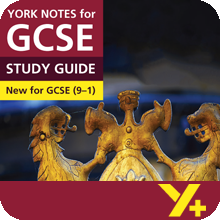Examiner's Notes
You assessed this answer as Grade 3.
Hover over the highlighted text to read the examiner’s comments.
Question: Read from Act I Scene 4 ‘’Tis he that villain Romeo ...’ (line 182) to ‘This trick may chance to scathe you’ (line 204). At this point in the play, Tybalt and Capulet discuss Romeo’s appearance at the ball.
Starting with this conversation, explore how Shakespeare presents Capulet’s attitude to young people in the play.
Write about:
- how Shakespeare presents Capulet’s attitude to young people in this conversation
- how Shakespeare presents Capulet’s attitude to young people in the play as a whole.
This scene is set at Capulet’s ball and his young nephew, Tybalt, is angry because Romeo, a Montague, has gatecrashed the party. Tybalt thinks that Capulet should ‘not endure’ having a Montague at the party. However, Capulet considers the social implications of Tybalt’s anger and demonstrates that, unlike his young nephew, he is willing to set rivalry aside for the sake of his reputation in front of his guests.
Capulet understands why Tybalt is upset about seeing a Montague in their household, but he is not prepared to challenge Romeo at his own party, and in his response to Tybalt he describes Romeo as a ‘virtuous and well-governed youth’. This suggests that Capulet is aware of some of Romeo’s positive traits. ‘Virtuous’ indicates that Romeo was considered to be good and possibly pious, whilst well-governed suggests that he controls himself well (unlike Tybalt, for example) and that he is also respected by society, and Capulet clearly cares a great deal about the perceptions of others. Although Capulet dislikes the Montague family, unlike Tybalt, he knows that a party is not the best time for confrontation. Capulet seems to value his reputation highly and he appears to be determined to guard his social status. He uses the line ‘for all the wealth in this town’ to warn Tybalt not to cause trouble. His use of such a strong, financial image indicates that he will not tolerate anything that might reflect badly on him. He also states that Tybalt will ‘make a mutiny amongst my guests!’ The use of the word ‘mutiny’ has implications of an uprising against his leadership and his concern for ‘my guests’ underlines the pride he feels in his role as host. The word ‘my’ implies his desire to control the experiences of those he seeks to entertain. He also seems to want to control Tybalt and his behaviour.
Capulet tells Tybalt that he must ‘be patient’. He twice calls Tybalt a ‘boy’ referring to his youth and he shows his own power as an older ‘master’ by commanding Tybalt several times to ‘Go to!’ implying that he must leave Romeo alone rather than to upset the whole party.
Therefore, in this scene, Capulet appears to be understanding of young people. This attitude is also revealed later when Paris asks him if he can marry Juliet. Capulet is willing to consider the request but he is also quite protective of his daughter as he thinks that she is very young and ‘a stranger in the world’.
However, once Capulet finally decides that Juliet should marry Paris, Shakespeare shows us a change in his character as he expects her to be ‘ruled in all respects’ by him. Moreover, we should remember that it would be normal for a father to expect his daughter to obey him in this period. As head of the household, his reputation would be at stake if his daughter defied him. So, although he may seem unreasonable to a modern audience, it is perhaps understandable. In affluent Elizabethan families it would be usual for a family to arrange a marriage to gain financially or for social status. This shows that he has a cruel, unforgiving side to his character. Capulet calls Juliet a ‘disobedient wretch’ when she will not do what he wants. Even when Juliet ‘kneels down’ and begs for his understanding, he remains angry with her.
Capulet’s desire for control over the young people affects the whole direction of the play: his force of will makes Juliet take a potion in order to avoid following his orders and this in turn leads to the death of both young lovers. His attitude finally changes once his daughter and Romeo are dead but it takes the extremity of these young people’s deaths to make him reconsider the ‘ancient grudge’ and to finally make peace with his enemies.
